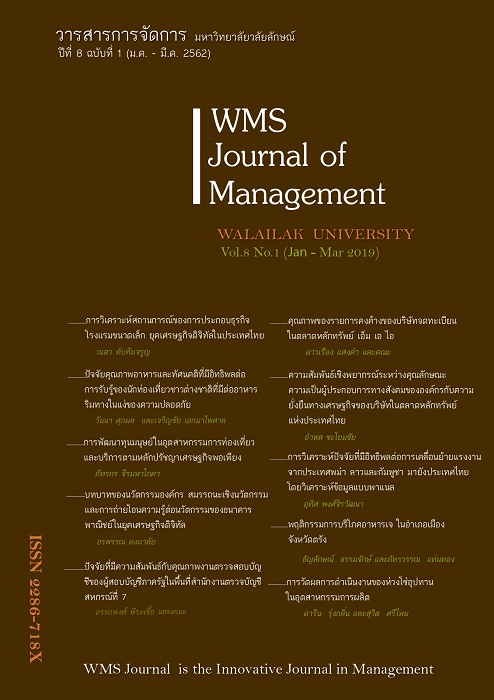The Predictive Relationship between Corporate Social Entrepreneurship and Corporate Economic Sustainability of the Listed Companies in the Stock Exchange of Thailand
Main Article Content
Abstract
The objective of this research was to study the predictive relationship between corporate social entrepreneurship and corporate economic sustainability of the listed companies in the Stock Exchange of Thailand. The averages of annual data of 351 listed companies in all 7 sectors of Stock Exchange of Thailand (SET) during period 2012 to 2014 were used for analysis. Descriptive statistics and Partial Least Squares regression analysis were performed. The new quantitative variables for corporate social entrepreneurship were developed. The results showed that (1) corporate social entrepreneurship had positive effect on corporate economic sustainability at a significant level of 0.05, (2) 10.5% of total variance of corporate economic sustainability was predicted by corporate social entrepreneurship, and (3) the important variables of corporate social entrepreneurship consisted of 8 variables included numbers of a collaboration with other parties, identifying societal orientation or sustainability orientation on president’s letter, promoting employees to participate in social/environmental activities, having a social/environmental/sustainability report, numbers of the information channel for stakeholders, having a social mission in strategic plan or business goal, numbers of social/environmental activities, and corporate governance rating. The research suggests that the listed companies where focus on economic sustainability should have company policies and operations that emphasize on the 8 important variables of corporate social entrepreneurship from this research model.
Article Details
References
Crisan, C.M., & Borza, A. (2012). Social entrepreneurship and corporate social responsibilities. International Business Research, 5(2), 106-113.
Dave, P., Wadhwa, V., Aggarwai, S., & Seetharaman, A. (2013). The impact of research and development on the financial sustainability of information technology (IT) companies listed on the S&P500 index. Journal of Sustainability Development, 6(11), 123-138.
Ergin, E. (2012). Corporate governance ratings and market-based financial performance: Evidence from Turkey. International Journal of Economics and Finance, 4(9), 61-68.
Esposito Vinzi, V. (2007). The PLS Approach to Data Exploration and Modeling: An everlasting matter of dispute or a playground for integrating different cultures? Retrieved from file:///C:/Users/Administrator. HZJ6O6TNH85GMNX/Downloads/Esposito%20Vinzi%20PLS'07%20(1).pdf
Gandy, J.D. (2012). The relationship between social entrepreneurship and organizational effectiveness (Doctoral dissertation). TX: Dallas Baptist University.
Garson, G.D. (2016). Partial least squares: Regression & structural equation models. US: Statistical Associates Publishing.
Haat, M.H.C., Rahman, R.A., & Mahenthiran, S. (2008). Corporate governance, transparency and performance of Malaysian companies. Managerial Auditing Journal, 23(8), 744-778.
Hadad, S., & Gauca, O. (2014). Social impact measurement in social entrepreneurship organizations. Management & marketing: Challenges for the knowledge society, 9(2), 119-136.
Hair, J.F., Black, W.C., Babin, B.J., & Anderson, R.E. (2014). Multivariate data analysis (7th ed.). NJ: Pearson Education.
Hair, J.F., Hult, G.T.M, Ringle, C.M., & Sarstedt, M. (2017). A Primer on Partial Least Squares Structural Equation Modeling (PLS-SEM) (2nd ed.). CA: SAGE Publications.
Henseler, J., Hubona, G., & Ray, P.A. (2016). Using PLS path modeling in new technology research: Updated guidelines. Industrial Management & Data Systems, 116(1), 2-20.
Hervieux, C., Gedajlovic, E., & Turcotte, M.B. (2010). The legitimization of social entrepreneurship. Journal of Enterprise Communities: People, and Places in the Global Economy, 4(1), 37-67.
Jackson, C.A. (2014). Corporate social responsibility training: Exploring the antecedents to corporate social entrepreneurship (Doctoral dissertation, Kansas State University).
Jiao, H. (2011). A conceptual model for social entrepreneurship directed toward social impact on society. Social Enterprise Journal, 7(2), 130-149.
Joseph, C. (2013). Understanding sustainable development concept in Malaysia. Social Responsibility Journal, 9(3), 441-453.
Lipunga, A.M. (2014). Corporate governance practices in commercial banking sector of Malawi: Evidence from annual reports. Journal of Applied Finance & Banking, 4(5), 115-133.
Mathew, S.K., & Rajan, T. (2013). Sustainability as an imperative and an opportunity: The case of Infosys Limited. Emerald Emerging Markets Case Studies, 3(2), 1-16.
McPhee, W. (2014). A new sustainability model: Engaging the entire firm. Journal of Business Strategy, 35(2), 4-12.
Michelon, G. (2011). Sustainability disclosure and reputation: A comparative study. Corporate Reputation Review, 14(2), 79-96.
Miles, J.A. (2012). Management and Organization Theory: A Jossey-Bass reader. San Francisco, MA: John Wiley & Sons.
Mitchell, S.F. (2012). An empirical investigation: How small to mid-sized enterprises use innovation on the path toward ecological sustainability (Doctoral dissertation, University of New Hampshire).
Movassaghi, H. & Bramhandkar, A. (2012). Sustainability strategies of leading global firms and their financial performance: A comparative case based analysis. Journal of Applied Business and Economics, 13(5), 21-34.
Pandey, C.L. (2014). The limits of climate change agreements: From past to present. International Journal of Climate Change Strategies and Management, 6(4), 376-390.
Rahman, M.A., & Mazlan, A.R. (2014). Determinants of financial sustainability of microfinance institutions in Bangladesh. International Journal of Economics and Finance, 6(9), 107-116.
Savitz, A.W. (2013). Talent, transformation, and the triple bottom line: How companies can leverage human resources to achieve sustainable growth. San Francisco, CA: Jossey-Bass.
Siew, R.Y.J., Balatbat, M.C.A., & Carmichael, D.G. (2013). The relationship between sustainability practices and financial performance of construction companies. Smart and Sustainable Built Environment, 2(1), 6-27.
Siminica, M., Craciun, L., & Dinu, A. (2015). The impact of corporate sustainability strategies on the financial performance of Romanian companies in the context of green marketing. Amfiteatru Economic, 17(40), 994-1010.
Stanley, S. (2012). The Evolution of Sustainability: A Public Relations and Business Argument (Master’s Thesis, University of Southern California).
Saul, P. (2011). Social innovation Inc.: 5 strategies for driving business growth through social change. USA: HB Printing.
Szekely, F., & Strebel, H. (2013). Incremental, radical and game-changing: Strategic innovation for sustainability. Corporate Governance, 13(5), 467-481.
Thompson, B.A. (2011). Evaluation of Factors on Financial Performance of the North American Cable Industry. (Doctoral dissertation, Northcentral University).
Ufere, K.J., Uche, A.G., & Alias, B.B. (2016). Social determinants of voluntary carbon information disclosure in the real estate sector of Malaysia. Studia Ubb Negotia, LXI(3), 69-83.
Vintila, G., & Gherghina, S.C. (2012). An empirical examination of the relationship between corporate governance ratings and listed companies’ performance. International Journal of Business and Management, 7(22), 46-61.
Zolfaghari, L. (2015). The impact of dynamic capabilities on sustainability performance in the biotechnology
industry. (Doctoral dissertation, Alliant International University).


